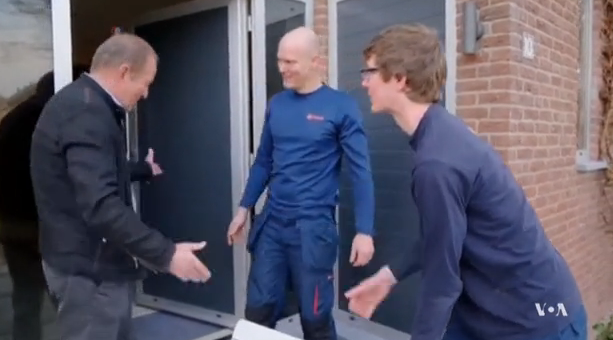VOA慢速英语: 电脑产生的热量可以为家庭供暖
- 参考译文
- 听力原文
Hot Computers Could Be Used to Heat Homes
电脑产生的热量可以为家庭供暖
When computer servers operate a complex program, they can get very hot. Cooling the servers can be costly. So researchers asked what would happen if the heat created by the servers could be captured and used?
当电脑服务器运行一个复杂的程序时它们会变得很热。冷却这些服务器代价会比较高。因此研究人员提出,如果服务器产生的热量能够被捕获并利用,会发生什么事情呢?
Data centers of large Internet companies such as Google and Microsoft have thousands of computer servers. As these servers process information, they create large amounts of heat, so they need huge cooling systems. These systems send the heat into the air.
许多大型互联网公司的数据中心比如谷歌和微软等有着成千上万台电脑服务器。当这些服务器处理信息时会产生大量热量。所以它们需要庞大的冷却系统,这些冷却系统将热量散发到空气中。
The Dutch company Nerdalize thinks paying for electricity to operate the servers and then paying again to cool them is a waste of energy. So it developed a device called the e-Radiator. It is a computer server that also works as a heating source.
荷兰的Nerdalize公司认为,掏电费运营这些服务器,然后再掏钱冷却它们是一种能源浪费。所以该公司开发了一种名为e-Radiator的装置,这是一种可以被用作热源的电脑服务器。
Boaz Leupe is the chief executive officer of Nerdalize. He says the e-Radiator saves money because companies don't have to pay to cool their servers.
Boaz Leupe是Nerdalize公司的首席执行官。他说e-Radiator可以节省资金,因为公司不用再掏钱冷却他们的服务器。
"...The kilowatt hour you are using is used twice -- once to heat the home and once to compute the client's task without the cooling overhead."
“你使用的电能被二次利用,一次是给室内供暖,一次是在无需冷却开销的前提下运算客户电脑的任务。”
He says five homeowners in The Netherlands are testing the heating device in their homes.
他说,荷兰的5户家庭正在他们家里测试这种热装置。
"We reimburse the electricity the server uses, and that we can do because of the computer clients on the other side, and, in that way, homeowners actually get heating for free, and computer users don't have to pay for the overhead of the data center."
“我们补偿了服务器使用的电力。我们能这样做是因为电脑客户机在另一面。通过这种方式,业主实际上免费得到供暖,而计算机用户不必支付数据中心的开销。”
Jan Visser is one of the participants in the year-long experiment. He says the amount of heat produced by the e-Radiator depends on the work being done by the computer server. He says it cannot be used as the primary source of heat. But he is ready to try it.
Jan Visser是这项长达一年的试验的参与者之一。他说,e-Radiator产生的热量取决于电脑服务器运行的任务。他说,它不能被用作主要热源,但是他乐于尝试它。
He says if it provides enough warmth, he will be able to use his home's heating system less, which will save him money.
他表示如果这种装置可以提供足够热量,那他就会少用家里的暖气,这会帮他省不少钱。
Nerdalize says e-Radiators create heat temperatures of up to 55 degrees Celsius. It says the devices could save users up to $440 in heating costs a year.
Nerdalize公司表示,e-Radiators能够产生高达55摄氏度的高温。该公司表示,该装置每年能给用户节省440美元的取暖费。
I'm Jonathan Evans.
我是Jonathan Evans。
Hot Computers Could Be Used to Heat Homes
When computer servers operate a complex program, they can get very hot.Cooling the servers can be costly. So researchers asked what would happenif the heat created by the servers could be captured and used?
Data centers of large Internet companies such as Google and Microsoft have thousands of computer servers. As these servers process information, theycreate large amounts of heat, so they need huge cooling systems. Thesesystems send the heat into the air.
The Dutch company Nerdalize thinks paying for electricity to operate theservers and then paying again to cool them is a waste of energy. So itdeveloped a device called the e-Radiator. It is a computer server that alsoworks as a heating source.
Boaz Leupe is the chief executive officer of Nerdalize. He says the e-Radiatorsaves money because companies don’t have to pay to cool their servers.
 |
|
When computers run a complex program, they get pretty hot. In fact, cooling the processors can be expensive, especially when you're dealing with huge banks of computer servers. But what if that energy could heat private homes? |
“…The kilowatt hour you are using is used twice -- once to heat the home andonce to compute the client’s task without the cooling overhead.”
He says five homeowners in The Netherlands are testing the heating devicein their homes.
“We reimburse the electricity the server uses, and that we can do because of the computer clients on the other side, and, in that way, homeowners actuallyget heating for free, and computer users don't have to pay for the overhead of the data center.”
Jan Visser is one of the participants in the year-long experiment. He says theamount of heat produced by the e-Radiator depends on the work being doneby the computer server. He says it cannot be used as the primary source ofheat. But he is ready to try it.
He says if it provides enough warmth, he will be able to use his home’sheating system less, which will save him money.
Nerdalize says e-Radiators create heat temperatures of up to 55 degreesCelsius. It says the devices could save users up to $440 in heating costs ayear.
I’m Jonathan Evans.
VOA Science Correspondent George Putic reported this story fromWashington. Jonathan Evans adapted it for VOA Learning English.Christopher Jones-Cruise was the editor.
________________________________________________________________
Words in This Story
data – n. facts or information used usually to calculate, analyze or plansomething
reimburse – v. to pay someone an amount of money equal to an amount thatperson has spent
overhead – n. costs for rent, heat and electricity that a business must payand that are not related to what the business sells
server – n. the main computer in a network which provides files and servicesthat are used by the other computers in the network
Do you think the e-Radiator will become a popular way to heat homes? Wewant to hear from you. Write to us in the comments section.
- 频道推荐
- |
- 全站推荐
- 推荐下载
- 网站推荐




















